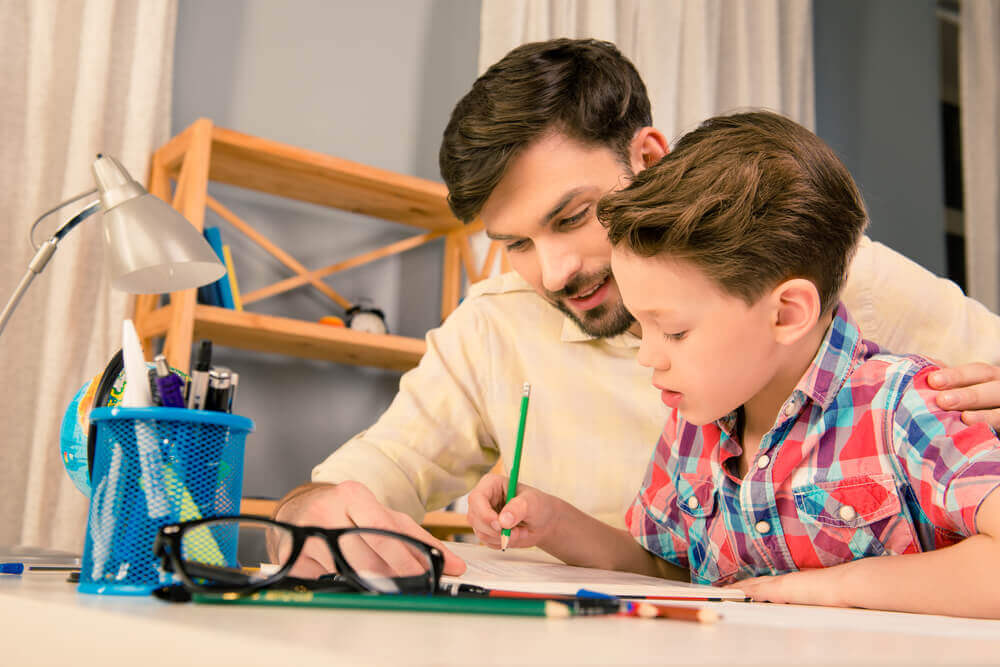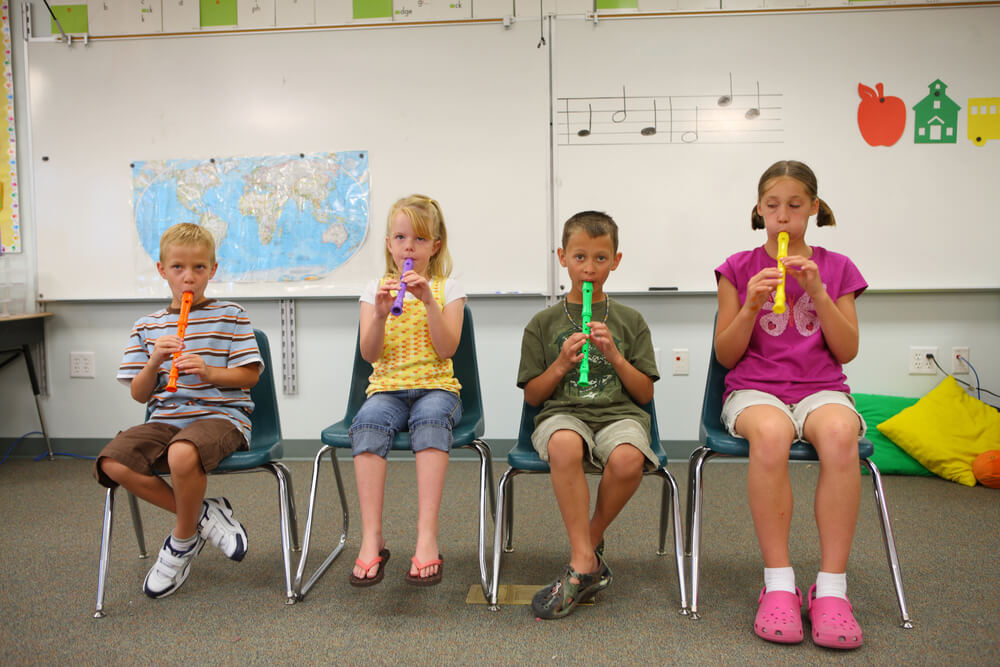Find Out How Your Child Did in School Without Being Direct

There are some communication strategies that are often helpful to know how your child did at school without being direct. We all want to know what the best thing that happened to our little ones during the day was, but in a friendly and casual way that encourages them to trust us and have a close and empathetic daily dialogue.
When children begin their school years, school becomes the second home that welcomes them to form them academically. However, it’s not only important to inquire about their student performance, but also to be aware of any emotional conflict they may experience with any of their friends or teachers.
10 questions to find out how your child did at school
All children have unique personalities that make them special. And while some tend to be very forthcoming with their parents about all the things they did at school, others tend to be more naturally reserved. Therefore, it’s essential to encourage dialogue to find out how your child did at school and to be present in all aspects of their student life.
These are some helpful questions to achieve this.
1. What was the best thing that happened to you during the day?
In order for children not to respond with simple monosyllables that immediately cut off the conversation, it’s very important to ask open-ended questions. You can use this every time you pick up your child at school to tell you what was the best and worst thing that happened during classes.

Even if they already know how to read and write, you can encourage the habit of writing these things down on paper so that they’re grateful for the gifts of life received daily and also for the things they can improve on.
2. What did you learn today?
Every day brings new knowledge and lessons, not only academic ones, but also life lessons. By asking this question from time to time, we can probe into those areas where children are especially empathetic. But we can also learn how their emotions are maturing over time.
3. What friends did you play with at recess?
School isn’t only for studying, but also for developing social relationships. For this reason, ask your children about their friends and how much fun they had at school. This will allow you to gradually get to know their social circle and who they socialize with when they’re not in class.
4. Did something bad happen today?
If you notice your son or daughter crestfallen and with a sullen attitude, it’s important to look them in the eyes, give them a hug, and ask them sincerely and empathetically if something has happened. Family communication is key. It’s very important to listen assertively and give children and adolescents life advice that they can apply in the future.
5. What was the best/worst moment of the day?
Just as there are days when everything goes smoothly, others, on the contrary, are full of challenges that may upset children. Remember that school isn’t some sort of prison or imposition and children should feel comfortable there. Asking about both the good and the bad of the day allows us to help children improve.
6. What was your favorite class and what did you learn in it?
All children have subjects in which they’re stronger than others. Some children tend to be more creative and enjoy music and drawing classes, while others are more analytical and prefer math and geometry. Asking about those areas that we know make our children happy makes them tell us naturally about them.

7. Did a classmate hurt your feelings?
When we perceive an abrupt change in our children’s personality, it’s very important to investigate the source of the problem. And although it’s important to be very tactful when discussing the subject, children should be given the confidence to talk to their parents. And, in this way, uncover possible bullying.
8. What was your favorite time?
While most kids will answer that it was recess, you might be surprised by your child’s answer, whether it was a test they did well on that made them feel happy and proud or perhaps a play activity. This way, we’ll know if something noteworthy has happened during the day that warrants our congratulations.
9. What do you like most/least about the school?
As parents, we make the decision to enroll our children in the school we consider most suitable. However, the children are the only ones who are living there on a daily basis. So, it’s also very important to know their opinion.
10. What would you do if you were the teacher?
Knowing the children’s point of view helps us to have a clearer picture of the things that happen in the classroom and how the children feel about it. By inviting them to take on the point of view of an authority figure such as their teacher, we can know how the children would react to certain circumstances that have them thinking.
To know how your child did at school, you need empathy
Keep in mind that the above questions shouldn’t become a daily interrogation. Sometimes kids just don’t want to talk and we can’t pressure them to do so. So, keep them as a guide, but use them in a natural and empathetic way so that children see in you a genuine and sincere concern.
There are some communication strategies that are often helpful to know how your child did at school without being direct. We all want to know what the best thing that happened to our little ones during the day was, but in a friendly and casual way that encourages them to trust us and have a close and empathetic daily dialogue.
When children begin their school years, school becomes the second home that welcomes them to form them academically. However, it’s not only important to inquire about their student performance, but also to be aware of any emotional conflict they may experience with any of their friends or teachers.
10 questions to find out how your child did at school
All children have unique personalities that make them special. And while some tend to be very forthcoming with their parents about all the things they did at school, others tend to be more naturally reserved. Therefore, it’s essential to encourage dialogue to find out how your child did at school and to be present in all aspects of their student life.
These are some helpful questions to achieve this.
1. What was the best thing that happened to you during the day?
In order for children not to respond with simple monosyllables that immediately cut off the conversation, it’s very important to ask open-ended questions. You can use this every time you pick up your child at school to tell you what was the best and worst thing that happened during classes.

Even if they already know how to read and write, you can encourage the habit of writing these things down on paper so that they’re grateful for the gifts of life received daily and also for the things they can improve on.
2. What did you learn today?
Every day brings new knowledge and lessons, not only academic ones, but also life lessons. By asking this question from time to time, we can probe into those areas where children are especially empathetic. But we can also learn how their emotions are maturing over time.
3. What friends did you play with at recess?
School isn’t only for studying, but also for developing social relationships. For this reason, ask your children about their friends and how much fun they had at school. This will allow you to gradually get to know their social circle and who they socialize with when they’re not in class.
4. Did something bad happen today?
If you notice your son or daughter crestfallen and with a sullen attitude, it’s important to look them in the eyes, give them a hug, and ask them sincerely and empathetically if something has happened. Family communication is key. It’s very important to listen assertively and give children and adolescents life advice that they can apply in the future.
5. What was the best/worst moment of the day?
Just as there are days when everything goes smoothly, others, on the contrary, are full of challenges that may upset children. Remember that school isn’t some sort of prison or imposition and children should feel comfortable there. Asking about both the good and the bad of the day allows us to help children improve.
6. What was your favorite class and what did you learn in it?
All children have subjects in which they’re stronger than others. Some children tend to be more creative and enjoy music and drawing classes, while others are more analytical and prefer math and geometry. Asking about those areas that we know make our children happy makes them tell us naturally about them.

7. Did a classmate hurt your feelings?
When we perceive an abrupt change in our children’s personality, it’s very important to investigate the source of the problem. And although it’s important to be very tactful when discussing the subject, children should be given the confidence to talk to their parents. And, in this way, uncover possible bullying.
8. What was your favorite time?
While most kids will answer that it was recess, you might be surprised by your child’s answer, whether it was a test they did well on that made them feel happy and proud or perhaps a play activity. This way, we’ll know if something noteworthy has happened during the day that warrants our congratulations.
9. What do you like most/least about the school?
As parents, we make the decision to enroll our children in the school we consider most suitable. However, the children are the only ones who are living there on a daily basis. So, it’s also very important to know their opinion.
10. What would you do if you were the teacher?
Knowing the children’s point of view helps us to have a clearer picture of the things that happen in the classroom and how the children feel about it. By inviting them to take on the point of view of an authority figure such as their teacher, we can know how the children would react to certain circumstances that have them thinking.
To know how your child did at school, you need empathy
Keep in mind that the above questions shouldn’t become a daily interrogation. Sometimes kids just don’t want to talk and we can’t pressure them to do so. So, keep them as a guide, but use them in a natural and empathetic way so that children see in you a genuine and sincere concern.
All cited sources were thoroughly reviewed by our team to ensure their quality, reliability, currency, and validity. The bibliography of this article was considered reliable and of academic or scientific accuracy.
- Bojorge-Martínez, A. E. (2016). Los patrones de comunicación familiar y su impacto en la promoción de la dieta correcta y la activación física en la adolescencia. Tesis de Maestría, Maestría en Comunicación de la Ciencia y la Cultura. Tlaquepaque, Jalisco: ITESO. Recuperado de: https://rei.iteso.mx/handle/11117/4391
- Chunga, L. S. (2008). Niveles de satisfacción familiar y de comunicación entre padres e hijos. Avances en psicología, 16(1), 119-137. Recuperado de: http://www.unife.edu.pe/publicaciones/revistas/psicologia/2008/sastisfaccionfamiliar.pdf
- Muratori, M., Delfino, G. I., & Zubieta, E. M. (2013). Percepción de anomia, confianza y bienestar: la mirada desde la psicología social. Revista de Psicología (PUCP), 31(1), 129-150. Recuperado de: http://www.scielo.org.pe/scielo.php?script=sci_arttext&pid=S0254-92472013000100005
- Naval-Duran, C. (2005). Ámbito familiar: confianza y respeto. Recuperado de: https://dadun.unav.edu/bitstream/10171/36803/1/Ámbito%20familiar%20(confianza%20y%20respeto).pdf
This text is provided for informational purposes only and does not replace consultation with a professional. If in doubt, consult your specialist.








